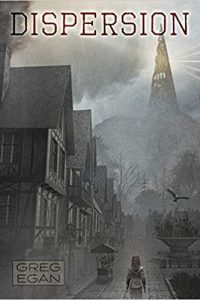Karen Burnham Reviews Short Fiction: Tor.com, BCS, Strange Horizons, Lightspeed, Bards and Sages, and Daily SF
 Tor.com 6/19/19, 7/10/19
Tor.com 6/19/19, 7/10/19
Beneath Ceaseless Skies 7/4/19; 7/18/19
Strange Horizons 7/19
Lightspeed 8/19
Bards and Sages Quarterly 4/19
Daily SF 7/4/19, 7/5/19, 7/8/19
Tor.com in June features a new Michael Swanwick story in his Mongolian Wizard series. It will come as no surprise that “The New Prometheus” draws from the Frankenstein corpus when protagonist Ritter pursues a being that clearly isn’t human across the Arctic wastes. In this case the “monster” stops and stays his journey awhile to tell Ritter his story, from the immense magical energy and tortured living tissue that went into his creation, through his training by many masters, to his rebellion and his travels since then. Any thoughtful Frankenstein’s monster is a mirror held up to humanity, even more so in this case when he is telepathic. I appreciate Swanwick’s take on the classic. Harkening back to an even older literary text, in July Siobhan Carroll gives us “For He Can Creep“. You don’t need to know anything about the 18th century poet Christopher Smart or his poem Jubilate Agno to appreciate this story of the cat Jeoffry who will fight the Devil himself to protect his asylum and his human within it. Narrated by Jeoffry with ultimate cat attitude poured into every line, all his interactions are both charming and intense.
In Beneath Ceaseless Skies #281, I enjoyed “Across the Bough Bridge” by MacKenzie Kincaid, which tells of a talented sculptor who heads across the bridge to the land of fae, and has to follow all the rules exactly if she’s to get the things she needs for her sick wife. The social dances of negotiation effectively ramp up the tension as we wait to find out what her end goal is. The first story in Beneath Ceaseless Skies #282 is “Gert of the Hundred” by L.S. Johnson. It starts out with a kindly healer named Gert and moves inexorably towards horror as we learn more about why the children who come to her are getting sick, as well as her backstory and how she’s come to be an outsider in this community. It is chilling and horrific, but also amazingly humane. “Faêl” by Tobi Ogundiran is much more mythic. It starts with a legend about a witch-king who seduces two moons but not the third, then moves to a plot where a Faêl man is bringing his wife, long since turned to salt, back to her ruined city for burial. There are twists and turns in this tale of violent immortals, and it comes to a very satisfying conclusion.
Strange Horizons in July starts out with Natalia Theodoridou‘s “Notes on a Resurrection“, a 360-degree perspective told in vignettes from many different viewpoints. Some young men of the town died in an industrial accident, but one came back from the dead at the funeral. We get scenes from his mother’s point of view, the families of the other boys, his friends, the insurance adjuster, the priest, etc. – even, unusually, from the resurrected boy himself. All are disquieted by something that should be so joyful, but is so clearly set against the normal flow of life. Another story making good use of a vignette structure is “Cavity” by Theresa DeLucci, where we learn of all the times a woman has knowingly or unknowingly encountered murderers in her life. It builds very effectively to its climax, with a sharp eye for social commentary along the way.
Resurrection of a sort features as well in “Regret, Return, Reignite” by Audrey R. Hollis, which is set in a world where the Underworld of Greek myth is a real place, and people can, Orpheus-like, attempt to retrieve their dead loved ones. Lyra journeys to retrieve her wife Justine, but the dead do not return whole. They have to figure out how to rebuild their lives, both together and at their university, when so much of Justine is insubstantial or missing. I could quibble that the story stops before it truly resolves, but the conceit of the story and the women’s determination to work through these consequences together is fantastic.
The original stories in Lightspeed for August place their focus largely on how characters react to strange circumstances. In “Robot Country” by Dominica Phetteplace, a woman participating in the post-anthropocene gig economy is hired for a wilderness mission but is quickly co-opted by a robot representative who offers her a better deal. I feel like this sort of future might be closer than we’d like. In “No Matter” by Kendra Fortmeyer, how would you feel if you met a woman claiming to be your husband’s (but not your own) time-traveling daughter? What kind of seeds of tension and doubt would it sow, even as you tried to put it down to a joke or a hoax?
On the fantasy side, “The Final Blow” by Scott Sigler tells of Manil, a young boy whose world is being destroyed by the raiders overrunning his village. His uncle, returned from a life of traveling, knows what the raiders are capable of and comes up with a plot that might let Manil, but almost no one else, survive. This is a story of a boy falling deeply into trauma. The last story is a little more like a fable, as “A Leash of Foxes, Their Stories Like Barter” by Cassandra Khaw gives us Lady Mary, who marries Mr. Fox, and a spurned suitor who follows them to their newlywed home and learns their secret. There’s a nice turn at the end when he tries to publicly accuse them and we learn more about the identity of the story teller.
I enjoyed “The Other Road” by Dana Beehr in Spring’s issue of Bards and Sages. Our POV character for the story is the demigod-like spirit of a now-decaying road. An ex-tyrant seeks her out, remembering the role she played in his story and how it turned out. Her perspective is an interesting one, as she converses with the fallen man but also perceives events large and small, forward and backward in time, that take place along her length. “The Astrolabe” by Andrew Knighton sketches out an interesting world where avian societies battle each other with naval ships as well as aerial combat. The admiral of one fleet is enraptured by a shiny astrolabe sent by an enemy, and her crew turns mutinous. “Zardanapulas” by Daniel Galef imagines a mighty emperor who turns all of his vast physical and mental resources into completely erasing himself from the world – from every book, from every history, and eventually from every memory. It’s a satisfying thought experiment, although the motivation for such an obsessive self-abnegating quest is left surprisingly vague.
Whenever you dip into Daily SF, you never quite know what you’ll get. You might get “The No-Nonsense, Bare-Necessities Guide to the Upcoming Apocalypse” by Filip Wiltgren, where the story is shorter than the title, or you might get “Let’s Pretend” by Mary Soon Lee with a portrait of a couple who are deeply in love when one of them is approached by decidedly non-humanoid aliens to come with them as a guide of sorts. The style of this story is particularly lovely, as the narrator is clearly trying to distance themselves from what happened. A story that makes good use of the flash length is “Search History for Elspeth Adair, Age 11” by Aimee Picchi, which tells its story of nascent female empowerment using only Google-ish search phrases. 100% contrived, but also adorable, funny, and surprisingly effective at outlining the tale.
Recommended Reading
“For He Can Creep”, Siobhan Carroll (Tor.com 7/10/19)
Karen Burnham is an electromagnetics engineer by way of vocation, and a book reviewer/critic by way of avocation. She has worked on NASA projects including the Dream Chaser spacecraft and currently works in the automotive industry in Michigan. She has reviewed for venues such as Locus Magazine, NYRSF, Strange Horizons, SFSignal.com, and Cascadia Subduction Zone. She has produced podcasts for Locusmag.com and SFSignal.com, especially SF Crossing the Gulf with Karen Lord. Her book on Greg Egan came out from University of Illinois Press in 2014, and she has twice been nominated in the Best Non Fiction category of the British SF Awards.
This review and more like it in the September 2019 issue of Locus.
 While you are here, please take a moment to support Locus with a one-time or recurring donation. We rely on reader donations to keep the magazine and site going, and would like to keep the site paywall free, but WE NEED YOUR FINANCIAL SUPPORT to continue quality coverage of the science fiction and fantasy field.
While you are here, please take a moment to support Locus with a one-time or recurring donation. We rely on reader donations to keep the magazine and site going, and would like to keep the site paywall free, but WE NEED YOUR FINANCIAL SUPPORT to continue quality coverage of the science fiction and fantasy field.






